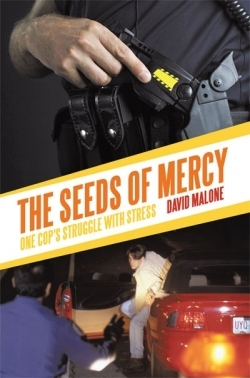
The Seeds of Mercy
One Cop's Struggle with Stress
Born into a traditional 1950’s era family, police lieutenant David Malone lived the American dream until the devastating loss of his mother to kidney failure while she was pregnant with his younger brother. Over time, the impact of this loss gained momentum and eventually took root as severe depression and post-traumatic stress disorder. This is Malone’s story.
Divided into nineteen chapters and an epilogue, the book opens to a domestic disturbance in 1981 that results in Malone shooting someone. It is one of many incidents he is exposed to during his law enforcement tenure, each of which leave invisible yet searing scars. The story progresses in a linear timeline from 1956, with his younger brother and several relatives, to his post-retirement life and speech at the 2000 Olympics.
David Malone is a retired police lieutenant from the Forth Worth Police Department.
Malone writes poignantly about a family united by love and separated by sickness and death. Much of his story is common enough. Malone comes of age and meets the woman he’ll eventually marry and decides to enter the police force because of a genuine desire to make a difference. “I can be a good cop. Besides, you can’t change anything wrong with society by grabbing some cushy job to make money…working together we [all cops] can make a difference.” But it’s his bountiful compassion and candor that make this a good read.
Thieves, drug dealers, and domestic violence all make Malone’s work on the force increasingly dangerous. His beloved father is afflicted with Alzheimer’s and Malone is conflicted about how to care for him and his own young family. Fellow officers die or suffer mental maladies and eventually he loses more loved ones.
This is a good, quick read and would serve as an ideal book club selection. Scenes, often vibrant with details of violent death, are carefully crafted yet simple. Not so flatteringly, there are times when certain people in Malone’s life seem like shadows instead of living, breathing entities. The single thing that would make this book perfect would be better physical descriptions of individuals, allowing readers to better grasp their personalities.
Most contemporary memoirs are much longer than 300 pages but Malone achieves great things with a mere 200 or so. This book is certain to maintain reader interest.
Reviewed by
Angela Black
Disclosure: This article is not an endorsement, but a review. The publisher of this book provided free copies of the book and paid a small fee to have their book reviewed by a professional reviewer. Foreword Reviews and Clarion Reviews make no guarantee that the publisher will receive a positive review. Foreword Magazine, Inc. is disclosing this in accordance with the Federal Trade Commission’s 16 CFR, Part 255.
